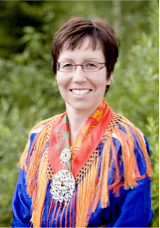INDIGENOUS SCHOOL DEVELOPMENT: Reducing the dominance of national curricula.
“Traditions are good, but do they really help the pupils become successful?”
I got the provocative question from a teacher in an action research and INDIGENOUS school development study. The teacher questioned if Indigenous education, gave pupils the best possibilities to become successful. There is, of course, no simple answer to that question. However, during the study as we reinterpreted Indigenous knowledge into culture-based teaching, the critical view become more positive.
What do I mean with culture-based teaching or Indigenous education?
The Sámi people is an Indigenous people that lives across the northern part of the North Calotte region, in Sweden, Norway, Finland and Russia. Education differs between these countries. In Sweden, Sámi children can receive their education in Sámi schools. Teaching in Sámi schools is today equivalent to national teaching, but Sámi schools shall also take into account and develop the Sámi language and culture. Initially the teachers critically examined their teaching; ‘What’s wrong?’ and ‘Where would we like to go?’… Sámi cultural themes inked to teaching, themes as reindeer herding, and….
Culturally sensitive teaching fundamentally change the teacher’s role and the community’s relationship with education. We worked together, teachers, pupils, community members, and I.
I and the other participants belong to the Sámi culture, and all of us wants that Sámi language and culture shall be part of our everyday life. I have a doctoral degree in Education, and today I teach at Sámi teacher education at Sámi University of Applied Science.
Prof. Mary Brydon-Miller who led the review writes about this article: “I’ve really enjoyed learning more about your work in the Sámi community and these important contributions to education and look forward to sharing this with colleagues working in Indigenous communities in other parts of the world.”
You can access this article for free for 30 days starting by using THIS LINK.
After you’ve had a chance to read this piece, please share your thoughts, ideas, or experiences with our community in the comments below so we can continue this discussion!
- Making Public Deliberations Inclusive with Mixed Methods AR - October 26, 2020
- Participatory action research with Aboriginal Elders: Ngulluk Koolunga Ngulluk Koort project - October 12, 2020
- Bringing the relational self to ART: Interview with Dr. Yvonne Skipper - October 1, 2020


